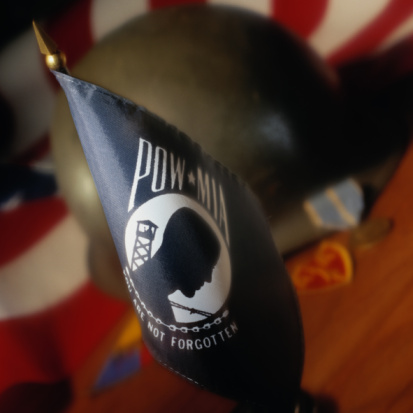Hidden . . . until Now
by Mary L. Hamilton
Jane Ellis never suspected that accepting a friend’s invitation to a Houston Astros game would bring her face to face with her hero of the past four decades.
“I jumped up when I recognized his name on the Jumbotron screen,” she said. “He was down on the field throwing out the first pitch.”
The name meant nothing to her friends, but after Leo Thorsness sat down in the VIP section, Jane announced to everyone around her that she’d worn his POW bracelet in 1971 and she intended to meet him.
Jane’s bubbly personality and bright smile haven’t changed much since she was 16 and a cheerleader at Mt. Pleasant High School in northeast Texas. At the time, the Vietnam War and all its controversy dragged on. Print and broadcast media reported daily casualty numbers that rose higher and higher. Equally disturbing was the number of servicemen held prisoner and tortured by the enemy. To keep those prisoners of war in the public mind and to pressure the North Vietnamese government for humane treatment, a California-based group began selling metal bracelets for $2.50, to be worn until the men were released and returned home. Each bracelet bore the name of a POW, his rank, and the date he was lost. Jane’s bracelet carried the inscription, “Lt. Col. Leo Thorsness, 4-30-67.”
For two years, the silver bracelet encircled her wrist. She wore it to football games, homecoming dances, and even prom. But more important, she wore it to weekly youth group meetings where she and her friends prayed for the welfare and safe return of Lt. Col. Thorsness and other POWs.
Jane remembers seeing him the first time in 1973, shortly after the United States pulled out of the war and negotiated the prisoners’ release.
“My family watched the evening news to see the planes of the returning POWs that landed that day. The announcer called out each name as they stepped off the plane.”
Suddenly, Jane heard the name engraved on her bracelet. Awestruck, her heart skipped a beat as the man she’d carried in her thoughts and prayers walked across the television screen.
“He looked tired and gaunt, very thin in his one-piece jumpsuit. But that smile on his face said he was so happy to be home.”
Her prayers for his safe return answered, Jane took off the bracelet and tucked it away. But the image of Lt. Col. Thorsness remained firmly embedded in her mind and heart. Now and then, she heard his name in the news but it was 2008 before she saw him again.
“While watching John McCain’s presidential campaign, I recognized Leo Thorsness sitting behind him on the platform.”
Motivated to research this man she called her hero, Jane learned that Lt. Col. Leo Thorsness, an air force pilot, had been shot down over North Vietnam in 1967. Captured almost immediately, he endured repeated torture during his six years at the infamous “Hanoi Hilton.” Though awarded the Congressional Medal of Honor while in captivity, it was kept secret for fear the information might be used against him by his captors. He’d achieved the rank of colonel before retiring and recently wrote a book entitled Surviving Hell: A POW’s Journey.
Now, seeing him live and in person at the ballpark, Jane felt compelled to convey her respect. She wanted him to know how deeply she appreciated his service and his sacrifice, how faithfully she’d worn his bracelet and prayed for him.
Unfortunately, her seat on the third level of Minute Maid Park kept her from getting anywhere near the VIP section. Attendants in four different areas listened to her story, but refused to grant access. One recommended the Fan Accomodation desk on the first floor “but no one there was even old enough to know what a POW bracelet was.” The best they could do was point to the most likely exit door, suggesting she might be able to catch him there after the game.
Disappointed, Jane returned to her seat. Surely this wasn’t just a freak coincidence. It felt like a “God moment,” a circumstance so unique that God must’ve orchestrated it. Settling in to watch the game, she decided to let God work out his moment without her help.
At the bottom of the sixth inning with the Astros up to bat, the promotions team approached Jane’s friend. Because she was sitting in Row 315, seat 5, a local business promised to award her friend $25,000 if the Astros hit a grand slam by the end of the inning. While the promo team members waited for the grand slam or the third out, Jane told them about the man sitting in the VIP section.
To read part 2, click here
Mary L. Hamilton is a freelance writer in Katy, Texas. Her eldest son serves in the Marine Corps.

2 Responses
Why does your story end so abruptly? Did she meet the former POW or not? Good story, but the ending….what happened?
Thanks for your comment.
You’re right: The previous article was cut off…in the print version as well. Our mistake!
I’ve now posted part two here
Thanks again for your comment!